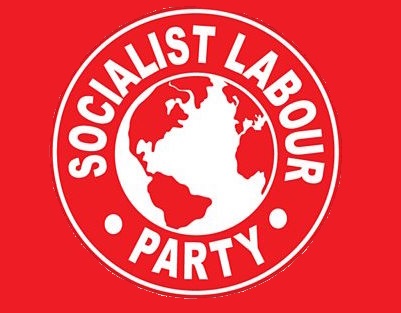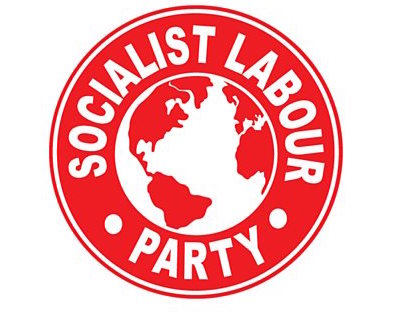Our General Secretary, Chris Butler, comments on Unite the Union’s reluctance to call out Keir Starmer for cutting benefits while pledging to increase defence spending.
“I notice that Unite does not comment on the reason why Starmer wants to make savings in the cost of benefits.
It is so he can increase defence spending to 5% of [UK] GDP. Unite does not comment because they have workers in the Arms Industry building weapons to kill innocent women and children in Gaza, including parts for the F35 fighter planes used to blitz Gaza.
Unite also has members building Small Modular Reactors producing nuclear power.
I don’t think Unite supports Welfare not Warfare.”
Chris Butler 30-6-2025
(It is worth noting that the UK currently spends 2.3% of its GDP on defence, which in 2024 was around £64 billion. The proposal by Starmer to increase defence spending to 5% of GDP will mean by 2035, the UK will be spending £140 billion every year on defence.)
Category: Uncategorized
-

Unite’s silent hypocrisy on Benefit Cuts
-

Message to the RMT from Arthur Scargill on the war in Ukraine
I fully support RMT’s Statement which calls for an end to the supply of weapons to Ukraine.
I estimate that the UK have expended £25 billion in support of Ukraine who came to “power as a result of a coup d’etat” .
The people, organisations who staged the overthrow of elected government are the same elements as those in the West of Ukraine who fought with the Nazis in the second world war
Yours in Comradeship
Arthur Scargill
President NUM. 1982- 2001
President I.E.M.O 1996 -to date
30th of June, 2025
(The original message to the RMT via email was censored as “inappropriate”.)
-

SLP Statement in support of the performers protest at Glastonbury
The Socialist Labour Party unequivocally express their support for performers at Glastonbury for their criticism of the ongoing genocide against the Palestinian people by the Israeli government and Israeli Defence Force, along with those who continue to give them support while attempting to criminalise anyone who speaks out in protest.
Their failure to act to prevent the continuing violation of international law makes all concerned, party to these crimes against humanity and everything possible must be done to bring them to answer before the international courts charged with upholding the law.
Arthur Scargill
John Tyrrell
Allistair Lomax
30th of June, 2025 -
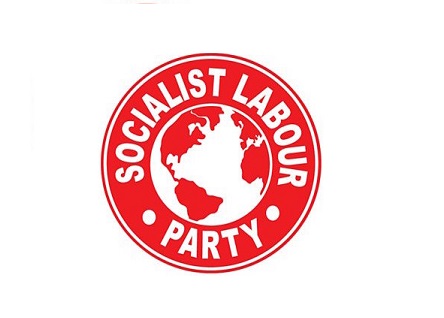
Socialist Labour Party Condemns Donald Trump and Israel For Joint Attack On Iran
The Socialist Labour Party condemns the military attack on Iran begun over the weekend by United States President Donald Trump acting in conjunction with the fascist state of Israel.
The bombing of Iran’s nuclear facilities makes a mockery of US calls for the restoration of “negotiations in accordance with the plan agreed in 2015 between Iran and the five permanent members of the United Nations Security Council plus Germany (the P5+1), a plan scrapped by Trump on 2018, during his first term as president.
This bombing not only violates international law but is In breach of the US Constitution as Trump has not even consulted the US Congress.
China, Russia, Venezuela, Cuba and North Korea have condemned the United States for its appalling act of aggression. The Socialist Labour Party calls on all governments which genuinely want peace, not world war, to join them.
What is needed are not empty pleas for “restraint” but action which will enable Iran to effectively counter the insane war-mongering of Donald Trump and the fascist state of Israel, and at the same time bring an end to Israel’s ongoing destruction of Palestine.
Socialist Labour Party
Sunday, 22 June 2025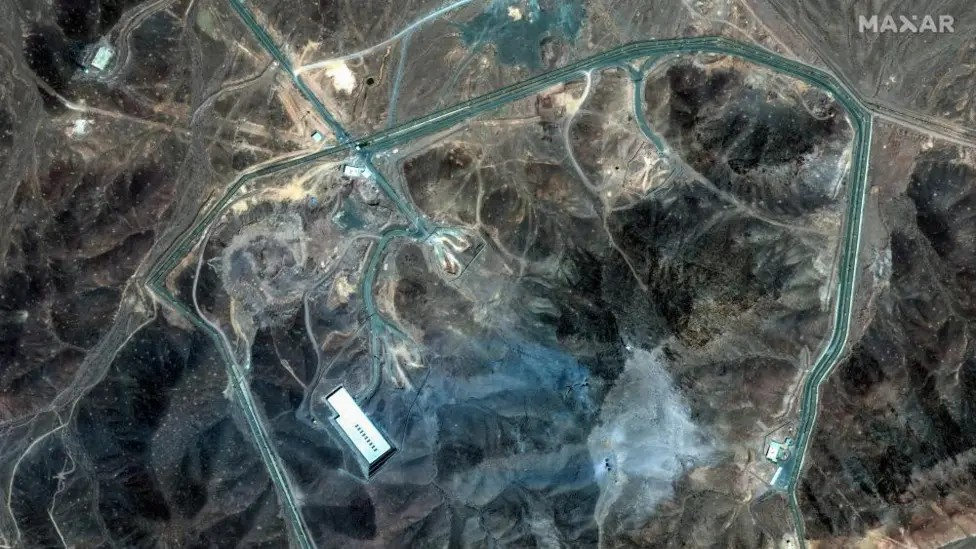
Satellite photo of Bombing site in Iran 
Route taken by the US to Bomb Iran -

Welfare or Warfare?
The position of the Socialist Labour Party
Welfare or Warfare, that is the question. That is the question that divides those who care for one another from those who want to dominate and kill others. It includes those who believe in helping others, in a welfare state, our NHS, housing, transport, fare wages, pensions and conditions at work, care for the elderly and disabled. Respect for gender and race. After all, It is warfare that creates the need for welfare.
The other side of the question contains those who want to dominate others, who think only about profit and power. Those who are prepared to use force to get their will, to suppress others and remove their liberty.
This, they dress up as the need to show strength, for security. They are prepared to invest in arms and weapons that will be used to kill others, to suppress others, to rob them of their well being and wealth. This is neo-colonialism, empire building. It will be dressed up as security, the need to protect ourselves. We need weapons for our defence. We need a strong arms Industry to build these weapons. After all, the arms industry provides jobs, well paid and highly skilled jobs. This is money well spent .
This is not defence, it is offense. It is possible to produce weapons for use to defend us in a case of aggression against us. This is quite different to weapons designed for offense, to kill and subjugate others.
The Arms industry does produce jobs. However, while siphoning off vast amounts of money it pollutes the planet while producing the means of killing people. The money invested in “defence” should go into industries producing many more secure, highly skilled jobs, meeting social needs – such as an integrated energy policy, involving all environmentally acceptable forms of energy: carbon-capture/clean-coal; wave; barrage; geo-thermal and, above all, solar power.
Why is it so much easier to find money for killing than money for social and economic well-being?
The Socialist labour Party is fully committed to Welfare, not Warfare. We believe that the wealth created by our industries must be invested in people, in their welfare, not in killing and suppressing people. We will restore all benefits and at the higher rate seen in many European countries. We will invest in industries producing socially useful products., in transport, housing, education, our NHS and our vital infrastructure. We will leave Nato, and produce arms only for defence. We will end austerity.
How will we pay for this? By a fair taxation system, taxing the rich and stopping tax evasion. Having left Nato we will not be raising the percentage of our GDP on arms, paid to the Arms Industry. We will cancel the renewal of the Trident Nuclear submarine fleet, producing an estimated saving of £205 billion. We will stop selling arms to conflict zones such as Palestine or the Ukraine which just fan the flames of war. Through nationalisation of our vital industries we will not be paying excessive bonuses to fat cat bosses. Our trade unions will play a vital part in ensuring safety and proper wages and conditions at work.
In this way we will be able to end austerity. To pay proper welfare benefits, pensions and wages to our citizens.
End austerity, Tax the rich. Welfare not warfare, comrades.
Arthur Scargill.
Chris Butler.
June, 2025
-
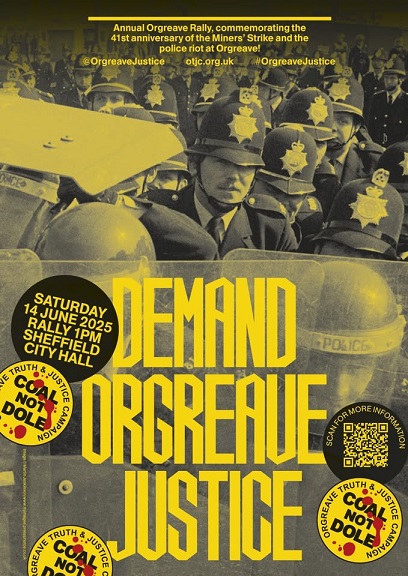
ORGREAVE ANNIVERSARY MARCH AND RALLY, 2025
Justice Delayed Is Justice Denied
ORGREAVE ANNIVERSARY MARCH AND RALLY
Saturday 14th of June 2025 Assemble 1pm City Hall, Barkers Pool, Sheffield, S1 2JA
SUPPORT US IN OUR CAMPAIGN FOR TRUTH AND JUSTICE ~
Come along and support the Annual Orgreave Rally organised by the Orgreave Truth and Justice Campaign, commemorating the 41st anniversary of the police riot at Orgreave and celebrating the great Miners’ Strike of 1984/5. Please bring your banners, placards, drums, whistles, family, comrades and friends. Led by the Unite Brass Band, come and march with us through Sheffield and support our call for an inquiry for truth and justice for striking miners brutalised by the state at the Orgreave Coking plant on 18 June 1984. SUPPORT OUR CALL FOR AN ORGREAVE INQUIRY SPEAKERS: • Watty Watson – Arrested and youngest sacked Scottish Miner • Lois Austin – Campaign Opposing Police Surveillance • Michael Mansfield KC – Lawyer for Orgreave miners • Maria Vasquez-Aguilar – Chile Solidarity Network • Chris Skidmore – Yorkshire Area NUM Chair and Orgreave Veteran • Kate Flannery – Orgreave Truth and Justice Campaign • Dave Smith – Blacklist Support Group COMPÈRES Chris Peace and Joe Rollin Orgreave Truth and Justice Campaign -
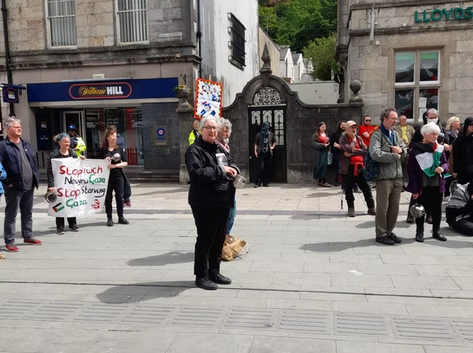
Bangor Gaza Solidarity Encampment – 1st Anniversary
The Encampment has been situated outside Bangor University since May 2024.The protest was much enlivened this Spring, after so much wind and rain into the New Year.It is a real achievement to have been in solidarity with the people of Gaza, in this terrible time of Genocide by Israeli government and military forces.Whilst supported locally,the leadership on the ground is students and other young people, they are spending their time in tents and maintaining the Encampment.
They have challenged the University management to disinvest from Israel, and continue with that demand.They also highlight the horrible ongoing Genocide, and campaign for a Free Palestine; the establishment and protected Internatjonal recognition of a Palestinian State. On the 24th of May they were at the head of a protest march, walking from the BBC offices in Bangor to the Clock Tower in the centre of Bangor.The protest was advertised as, Stopiwch lwgu plant Gaza, Stop starving the children of Gaza. People were asked to wear black and carry an empty saucepan.
This was a series of protests against BBC offices in Wales.I00 people + took part in a powerful show of solidarity with the people of Gaza.
Three of us from the local Socialist Labour Party took part. Kathrine Jones, SLP Welsh Region 25/5/2025
-

Double Standards!
It appears from news reports that the London Metropolitan Police have found the time and resources to investigate an incident from over a year ago where a member of a young Irish hip hop group flew a flag of a group or groups who oppose Israeli aggression and genocide. This has resulted in a charge associated with a “terror offence” to which a young man from Belfast will be required to appear at Westminster Magistrates Court next month.
Here’s a thing, the same Metropolitan Police have, as they acknowledge on their own website, a responsibility if“a UK resident has been responsible for core international crimes anywhere in the world (then) they may be investigated and prosecuted in the UK”. Such “core international crimes” include a litany of serious offences including genocide, war crimes and crimes against humanity.
I suggest to the Metropolitan Police Force or for that matter any police jurisdiction within the UK that they need not focus their attention or resources on minor matters such as the waving of flags but rather focus higher up the scale of seriousness of offence such as complicity, aiding and abetting or furnishing the means to commit such serious crimes. I suggest to the Met that they need not have to cast their net across the Irish Sea but rather just stroll a few hundred yards along the Thames. There they will find several senior government figures and officials well worthy of serious “core international crimes” investigation.
James McDaid, Leader, Socialist Labour Party. 24/5/2025
